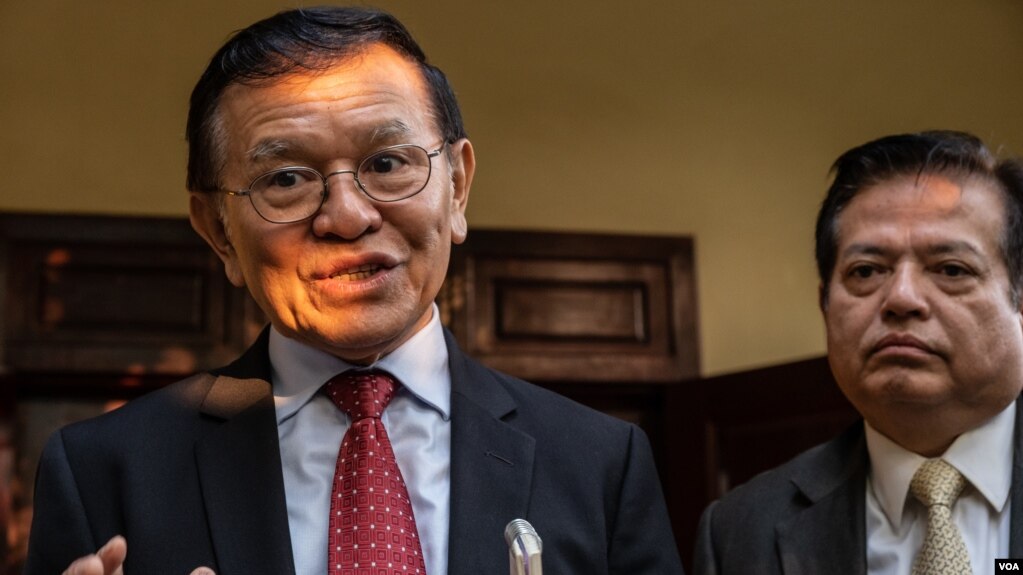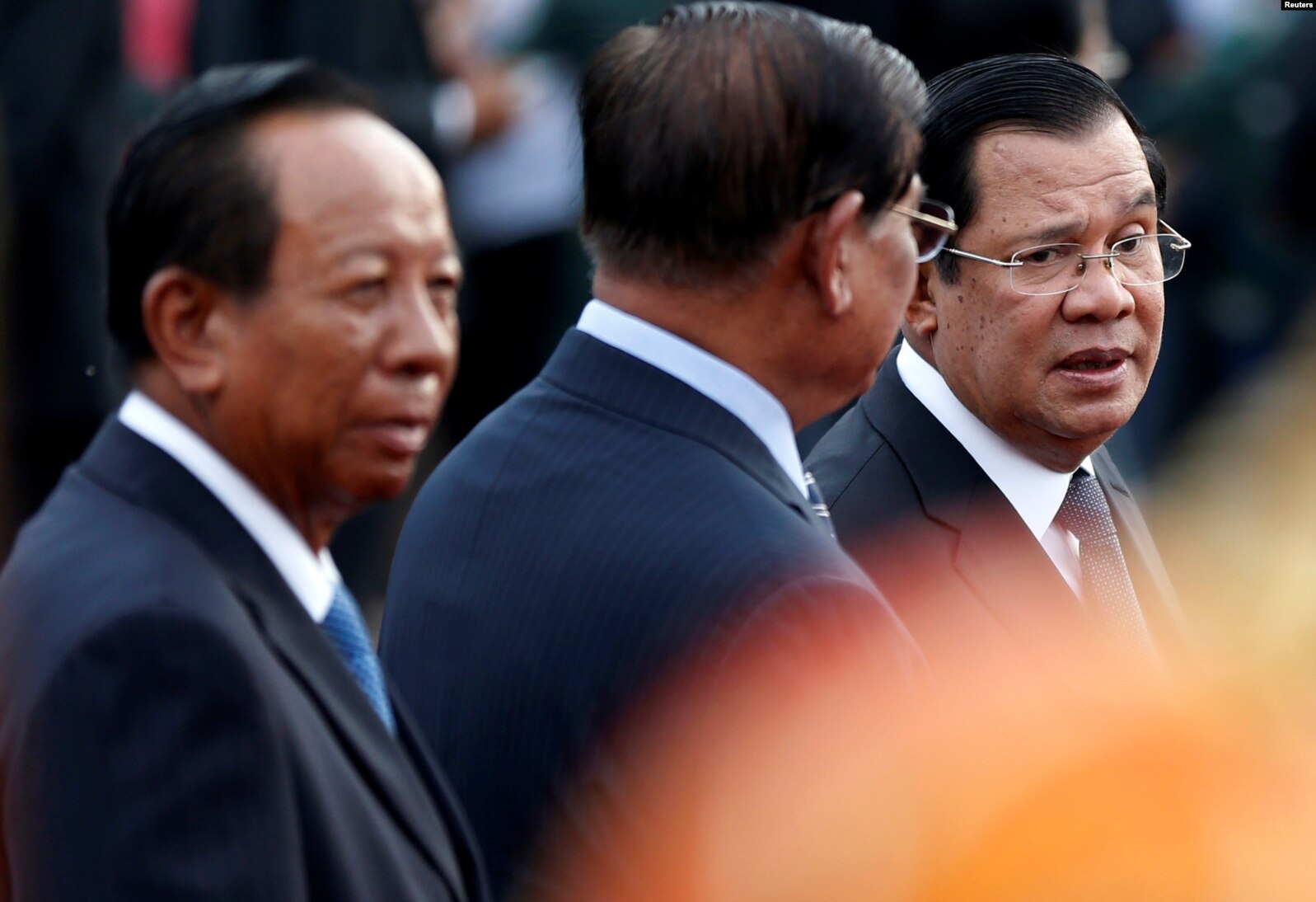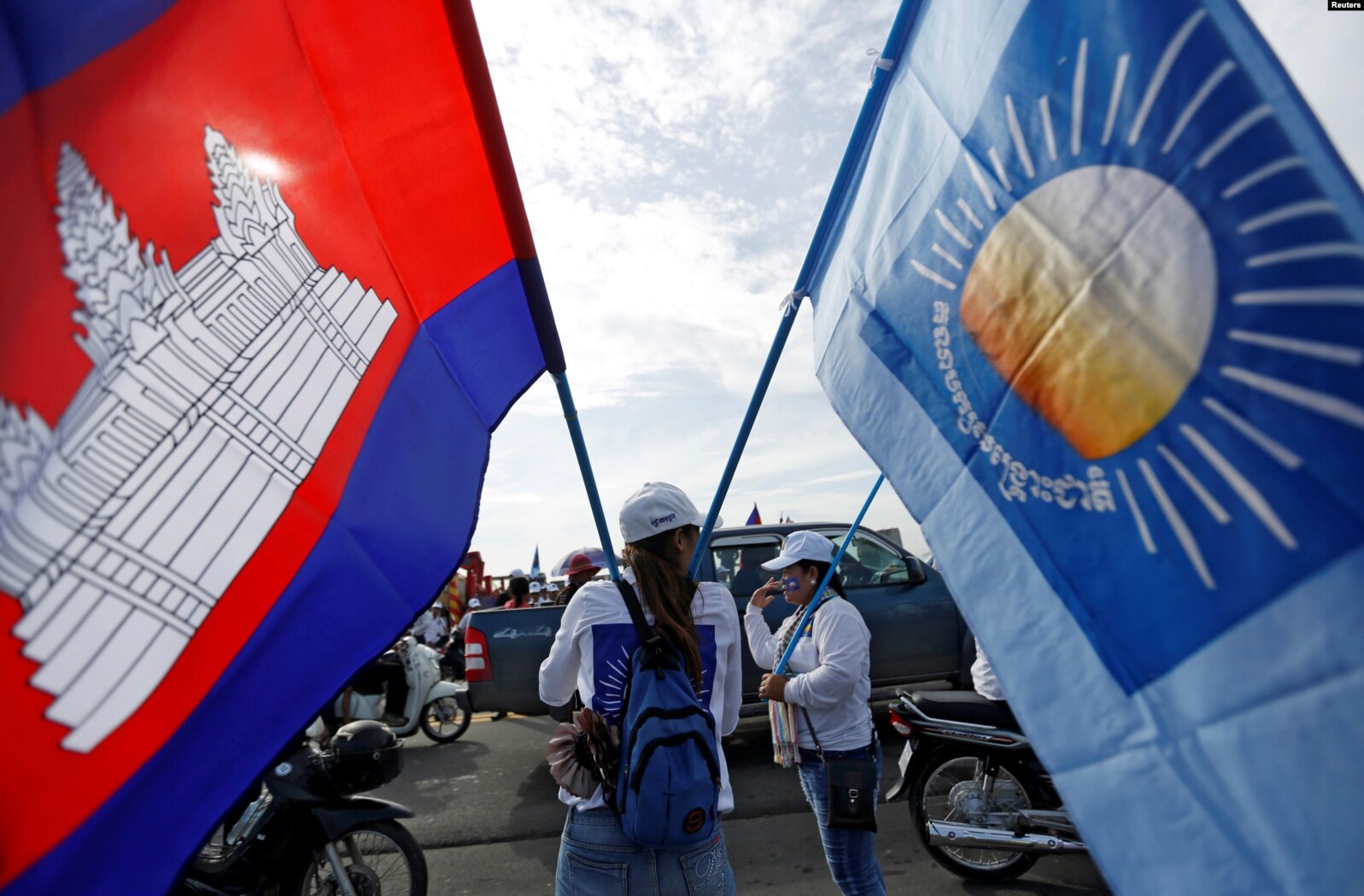Khmer Circle: Here's something to mull over: Do objects in motion stop moving as they become tired - according to Aristotle - or Do they stop because they hit a barrier or a counter force stronger than them?
???
28 January 2020
Hul Reaksmey
voa

Kem Sokha, former leader of the now-banned Cambodia National Rescue Party (CNRP), speaks to media as he departs his residence for the Phnom Penh municipal court for his trial on January 22, 2020. (Tum Malis/VOA Khmer)
PHNOM PENH —
As opposition leader Kem Sokha’s treason trial enters its third week, observers and political analysts say even the commencement of the trial, setting aside questions about the charges, signals a further deterioration in Cambodia’s more than two-year long democratic backslide.
The trial for Kem Sokha commenced on January 15, with a senior court official confirming that the trial would take at least three months to conclude. This time frame takes the trail well past the European Commission’s February 12 deadline to issue its final findings on whether to suspend Cambodia’s access to trade privileges.
The trial has already seen its fair share of criticism with opposition supporters calling it’s a show trial and ruling party officials, saying it was part of the judicial process. Additionally, the court prevented independent journalists and NGOs from entering the trial for the first week, despite accounts from attendees suggesting there were vacant seats in court.

FILE - Cambodia's Prime Minister Hun Sen and top ruling party leaders gathered as they attended the annual Water Festival on the Tonle Sap river in Phnom Penh, Cambodia, November 10, 2019.
But, observers said the optics of having a trial would reflect negatively for the government, but that it should not rule out the potential for a negotiated political deal, if it benefitted the government’s standing with EU.
Ear Sophal, an associate professor on Diplomacy and World Affairs at the Occidental College in Los Angeles, said the “show trial” was based on domestic political calculations – to benefit the CPP’s elites.
“It means tormenting the man [Kem Sokha] yet again, for no reason other than political benefit by the ruling party and its leadership,” Ear Sophal said in an email.
Three United Nations special rapporteurs issued a statement on January 17 calling the trial “tainted by irregularities,” referring to Kem Sokha arrest in September 2017 and the entire judicial process till the start of the trial.
“We have strong grounds to believe that the treason charge against Mr. Sokha is politically motivated and forms part of a larger pattern of the misapplication of laws to target political opponents and critics of the Government,” the experts said in the statement.

FILE - Supporters of the Cambodia National Rescue Party (CNRP) gather during a local election campaign in Phnom Penh, Cambodia May 20, 2017.
Author Sebastian Strangio said the ruling party was keeping in mind the political implication of releasing Kem Sokha – now potentially more popular than before – or even allowing him to revive the dissolved Cambodia National Rescue Party.
This consideration, he said, would decide the outcome of the trial and Kem Sokha’s political future.
“The CPP is still clearly concerned about the potential for Kem Sokha to rally opposition against its rule,” said Strangio, who is the author of “Hun Sen’s Cambodia.”
“If allowed full freedom of action, Sokha and a reinvigorated CNRP could well pose an existential threat to the CPP government at the next election in 2023,” he wrote in an email.
Irrespective of the trial’s outcome, Kem Sokha is still banned from political activity on account of a 2017 Supreme Court ruling that dissolved the CNRP and banned its senior members from the political arena.
Both Ear Sophal and Strangio pointed out that the trial’s outcome was closely linked to the EU’s assessment of Cambodia’s human rights record and its potential impact on trade privileges.
Strangio said the Cambodian government would once again engage in the complex political dance with the Western democracies by linking the trial’s outcome to the EU’s next move on ‘Everything But Arms’ trade privileges.
“Based on past precedent, the government is probably hoping to use the trial as an opportunity to smooth Sokha’s return to political life (even if he is found “guilty”), in return for a renewal of its EBA privileges,” he said in the email.
But, Justice Ministry spokesperson Chin Malin said that the court would not be swayed by “political tendencies” of commentators, but also de-linked the trial from the EBA review.
“This is what they understood based on their political tendencies” he said. “For EBA, it’s a different story that the government is still negotiating with the European Union.”
Ear Sophal, however, pointed out that the compromise would be one of the following: dismissal of the charges, which was the “best case scenario,” an expedited trial or “less ideally” conviction on a lesser charge, with no additional jail time.
“Last scenario is conviction but then immediate pardon. [Here] everyone "saves" face but opposition is still destroyed. EBA could then in theory be "saved," he wrote.

2 comments:
Ah Prett Teang Bey Kbal Chit Ngorp Heuy !!
The verdict will be decided outside the court. In fact, the verdict has probably been decided by Hun Sen. Anyone even with a slight of intelligence can guess what the outcome of this trial will be, that is Kem Sokha will be found guilty for treason and the king will pardon him as instructed by Hun Sen and the West will be quite satisfied with the result and no EBA will be lifted from Cambodia. It's a win-win for everybody. That's precisely Hun Sen's strategy. If he could fool the West so many times in the past, why can't he fool the West again this time?
Post a Comment